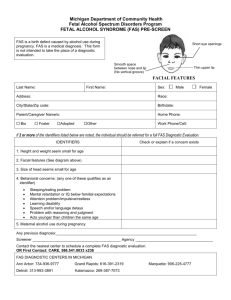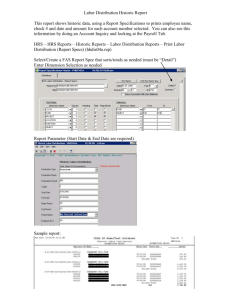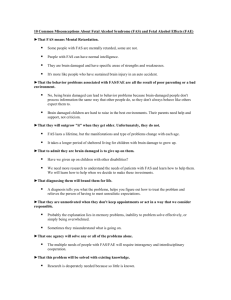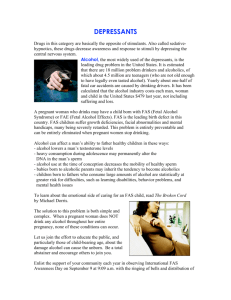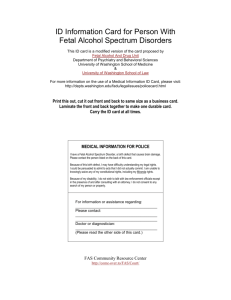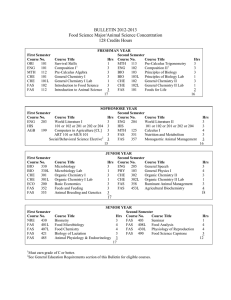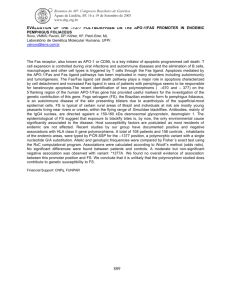Document 11867159
advertisement
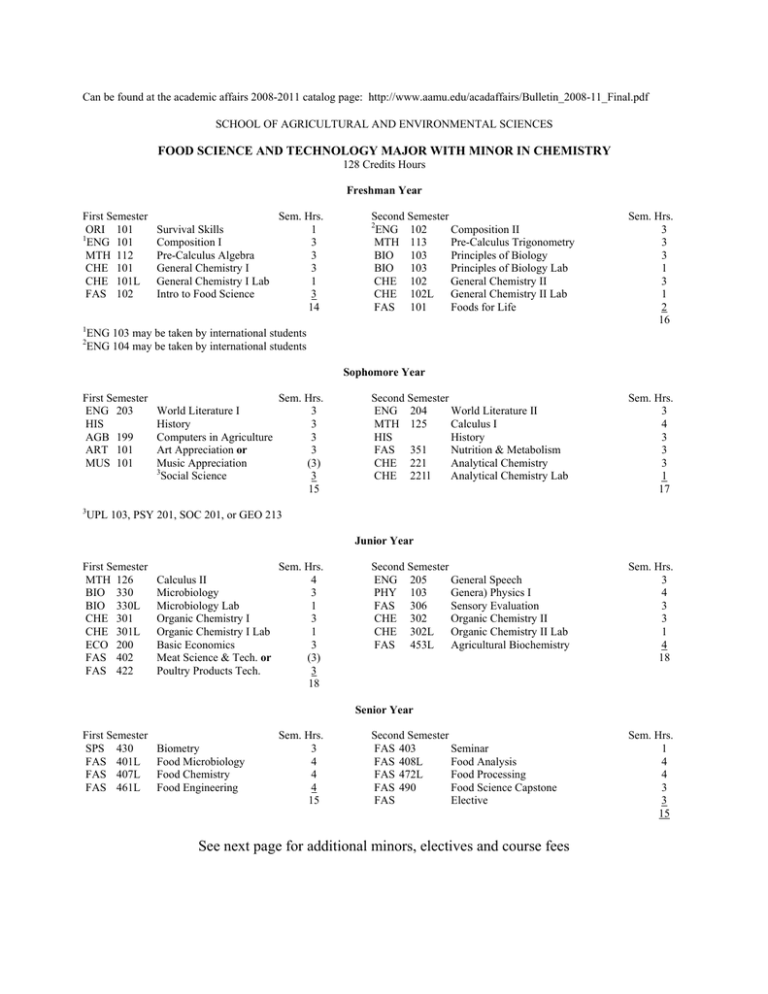
Can be found at the academic affairs 2008-2011 catalog page: http://www.aamu.edu/acadaffairs/Bulletin_2008-11_Final.pdf SCHOOL OF AGRICULTURAL AND ENVIRONMENTAL SCIENCES FOOD SCIENCE AND TECHNOLOGY MAJOR WITH MINOR IN CHEMISTRY 128 Credits Hours Freshman Year First Semester ORI 101 1 ENG 101 MTH 112 CHE 101 CHE 101L FAS 102 Survival Skills Composition I Pre-Calculus Algebra General Chemistry I General Chemistry I Lab Intro to Food Science Sem. Hrs. 1 3 3 3 1 3 14 Second Semester ENG 102 Composition II MTH 113 Pre-Calculus Trigonometry BIO 103 Principles of Biology BIO 103 Principles of Biology Lab CHE 102 General Chemistry II CHE 102L General Chemistry II Lab FAS 101 Foods for Life 2 Sem. Hrs. 3 3 3 1 3 1 2 16 1 ENG 103 may be taken by international students ENG 104 may be taken by international students 2 Sophomore Year First Semester ENG 203 HIS AGB 199 ART 101 MUS 101 World Literature I History Computers in Agriculture Art Appreciation or Music Appreciation 3 Social Science Sem. Hrs. 3 3 3 3 (3) 3 15 Second Semester ENG 204 World Literature II MTH 125 Calculus I HIS History FAS 351 Nutrition & Metabolism CHE 221 Analytical Chemistry CHE 221l Analytical Chemistry Lab Sem. Hrs. 3 4 3 3 3 1 17 3 UPL 103, PSY 201, SOC 201, or GEO 213 Junior Year First Semester MTH 126 BIO 330 BIO 330L CHE 301 CHE 301L ECO 200 FAS 402 FAS 422 Calculus II Microbiology Microbiology Lab Organic Chemistry I Organic Chemistry I Lab Basic Economics Meat Science & Tech. or Poultry Products Tech. Sem. Hrs. 4 3 1 3 1 3 (3) 3 18 Second Semester ENG 205 General Speech PHY 103 Genera) Physics I FAS 306 Sensory Evaluation CHE 302 Organic Chemistry II CHE 302L Organic Chemistry II Lab FAS 453L Agricultural Biochemistry Sem. Hrs. 3 4 3 3 1 4 18 Senior Year First Semester SPS 430 FAS 401L FAS 407L FAS 461L Biometry Food Microbiology Food Chemistry Food Engineering Sem. Hrs. 3 4 4 4 15 Second Semester FAS 403 Seminar FAS 408L Food Analysis FAS 472L Food Processing FAS 490 Food Science Capstone FAS Elective See next page for additional minors, electives and course fees Sem. Hrs. 1 4 4 3 3 15 Students taking additional minors must take extra courses as indicated below. Minor Animal Science Total Hours 129 Business 135 Nutrition 135 Courses FAS 112 FAS 352 FAS 353 Sem. Hrs. Introduction to Animal Science 3 Feeds and Feeding 3 Animal Breeding and Genetics in place 3 of FAS elective ACC ACC MKT ECO MGT Introduction to Accounting I Introduction to Accounting II Principles of Marketing Principles of Microeconomics Principles of Management in place of FAS Elective 3 3 3 3 3 Principles of Nutrition Science of Food Preparation Advanced Human Nutrition *Electives 3 3 3 9 203 204 315 232 315 NHM 102 NHM 210 NHM 405L NHM *3 hrs. of FAS elective may be substituted by 3 hrs. of NHM elective *NHM electives: NHM 306,407,408L, 409L and 410 Electives Course # FAS 112 FAS 312 FAS 405 FAS 442 FAS 450 Course Title Introduction to Animal Science Food Service Health Management Special Problems Fruits, Vegetables, Cereal Products Regulation Food Safety Sem. Hrs. 3 1 2-3 3 3 SPECIAL FEES - PER SEMESTER (Non-Refundable) Course # Course Title Fees Fees FAS 401L FAS 407L FAS 408L FAS 430L FAS 453L FAS 461L FAS 472L Food Microbiology Food Chemistry Food Analysis Physiology of Reproduction Agricultural Biochemistry Food Engineering Food Processing 20.00 20.00 20.00 20.00 20.00 20.00 20.00 DEPARTMENT OF FOOD AND ANIMAL SCIENCES 125-A Carver Complex Thomas Wing (256) 372-5445 Introduction The Department of Food and Animal Sciences offers B.S. degree programs in Food Science and Technology and Animal Science. The Department also offers Master of Science and Doctor of Philosophy programs in Food Science. An extensive research program provides unique opportunities for undergraduate students enrolled in the department to gain valuable practical experience in their chosen field of study. Program Offerings The major in Food Science and Technology, which is certified by the Institute of Food Technologists (IFT), was developed to train individuals to meet the needs of the food industry and other agencies for competent food technologists and research-oriented personnel. It provides a broad educational background in the science and technology of food. The curriculum has been made sufficiently flexible to meet the needs and interests of individual students by permitting a selection of minors within the framework of the recommended program. Students selecting a minor field of study should select a minimum of 18 hours in the minor area of which 6 hours must be at the 300 level or above. Before selecting a minor, students must consult with their academic advisors early in the degree program selection process. The major in Animal Science prepares the student for positions in the feed and pharmaceutical industries, with government agencies as inspectors or consultants, as farm managers, and for positions with financial institutions or real estate firms. The curriculum provides a strong background in the art and science of farm animal production and management and also prepares students for entry to veterinary colleges. The minor options allow selection of appropriate supporting courses for the student’s areas of interest including Chemistry, Agribusiness and Food Science. Student/Professional Organizations Alpha Zeta Honorary Society Block and Bridle Club IFTSA (AAMU Chapter) / Food Science Club Minorities in Agriculture, Natural Resources and Related Sciences (MANRRS) Phi Tau Sigma Honor Society Participation in student organizations is encouraged as this provides opportunities for networking and exposure to your chosen professional area. Financial Assistance/Scholarships In addition to financial assistance provided by federal and state governments and AAMU’s institutional aid programs, there are School of Agricultural and Environmental Sciences, and Department of Food and Animal Sciences financial assistance and scholarship awards. Students may also qualify for Institute of Food Technologists awards and other professional organizations’ scholarship programs. Graduation Requirements In order to graduate with a B.S. degree in Food Science and Technology or Animal Science, a student must: officially declare one of the above referenced programs as a major and complete all courses as outlined in the curriculum with a minimum cumulative grade point average of 2.0. Candidates must also complete all core courses in the major with a grade of C or better in each course. COURSE DESCRIPTION While every effort is made to offer courses as indicated in the course descriptions, it sometimes becomes necessary to cancel courses. In the event of course cancellation, students should consult their academic advisors for selection of alternate courses. FAS 101 Foods for Life – 2 hrs. The study of most common information regarding food and its role in human society. Prerequisite: None (Offered Fall and Spring) FAS 102 Introduction to Food Science – 3 hrs. Food science and its relation to agriculture; opportunities in the various fields of food industry; trends in procurement, management, processing, distribution and utilization of food; food raw materials and constituents; biochemical aspects of food composition; food spoilage; and principles of food processing and preservation. Prerequisite: None (Offered Fall) FAS 112 Introduction to Animal Science – 3 hrs. An introduction to the total animal industry covering dairy and beef cattle, swine, poultry, sheep, goats, rabbits, and horses. The material is divided by topics such as nutrition, reproduction, breeding, genetics, milk secretion, markets, meat processing and others, which include consideration of all species. Students will develop an appreciation for animal science and the application of sound business principles. Prerequisite: None (Offered Fall) FAS 306 Sensory Evaluation – 3 hrs. A study of principles and methodology of sensory evaluation; application of methods; instrumentation in physical evaluation of food; and analysis of sensory and instrumental data. Prerequisite: FAS 102 (Offered Spring) FAS 311 Fundamentals of Dairy Science – 3 hrs. Introduction to the fundamentals of dairy in the United States. Types of dairy farms, selection and breeding; raising and managing dairy calves and heifers; care and management of cows and sires; and factors influencing the quantity and quality of milk and milk products are addressed. Labor-saved devices and practices used to develop economical and efficient herd management will be presented. Prerequisite: FAS 112 (Offered Spring) FAS 312 Food Service Health Management – 1 hr. Short course offered through Madison County Health Authorities for Food Service Managers certification with 14 hours classroom contact. Course is designed to give managers and owners the skills to find the food-borne illness hazards in their operations. Students are introduced to a system which utilizes policies, procedures and standards designed to prevent recurring problems. Basic sanitation management principles will be discussed. After completing the course, participants will be prepared to develop or upgrade their food safety program using HACCP (Hazard Critical Control Procedure) concepts. Prerequisite: None (Offered Fall, Spring, and Summer) FAS 325 Fundamentals of Poultry Science – 3hrs. Basic course in poultry science that involves principles and practices in production and marketing of poultry and poultry products in a highly specialized industry. Practice consists of hands-on application of basic skills required for efficient production and management. Prerequisite: FAS 112 (Offered Fall) FAS 326 Poultry Production & Management – 3 hrs. A comprehensive study of various management practices, including brooding of broiler and replacement pullets, management of layers and other classes of poultry such as turkeys, geese, ducks, and so forth. Emphasis will also be given to current practices in the poultry industry through visits to area commercial operators. Nutrition and disease management will also be addressed. Prerequisite: FAS 325 (Offered Spring) FAS 351 Nutrition and Metabolism – 3 hrs. Introduction to nutrient digestion and metabolism in monogastrics and ruminants. The students will become acquainted with physiological and biochemical mechanisms of nutrient utilization. Prerequisites: CHE 102, CHE 102L, BIO 103, and BIO 103L (Offered Spring) FAS 352 Feeds and Feeding - 3 hrs. Introduction to livestock feeds and their utilization in meeting the nutrient requirements of animals producing meat, milk fiber, and eggs. The student will become acquainted with ration formulation and laboratory procedures for determining feed composition. Prerequisite: FAS 112 (Offered Fall) FAS 353 Animal Breeding & Genetics - 3 hrs. Concepts and principles of genetics applied to animal breeding, including Mendelian inheritance, gametogenesis, molecular genetics, modes of gene action, inheritability estimation, progeny testing methods, inbreeding and outbreeding systems, and recent advances in animal genetic engineering. Prerequisites: BIO 103, BIO 103L, and FAS 112 (Offered Fall) FAS 354 Beef Cattle Production - 3 hrs. Consideration of basic principles and methods of application involved in breeding, feeding, management, diseases, and marketing of beef producing animals. Prerequisite: FAS 112 (Offered Fall) FAS 355 Livestock Judging - 3 hrs. Theoretical and practical techniques relative to the selection of farm animals based on their physical attributes, the intent of which is to acquire the ability to recognize superior animals for breeding purposes and to recognize those animals that will be outstanding producers of meat and milk for human consumption. Prerequisite: FAS 112 (Offered Fall) FAS 356 Swine Production - 3 hrs. Study of the basic principles and their practical application in efficient pork production. All areas of production, breeding, selection, nutrition, housing, equipment, marketing, herd health, and economic management are included. Prerequisite: FAS 112 (Offered Spring) FAS 401L Food Microbiology – 4 hrs. A course on theoretical and practical studies of the role of microorganisms in foods pertaining to processing, preservation, quality, product development and spoilage. Also, this course acquaints students with quantitative and qualitative microbial evaluation techniques applicable to the food industry and science. Prerequisites: BIO 330 and BIO 330L (Offered Fall) FAS 402 Meat Science & Technology -3 hrs. Theoretical and practical aspects of slaughtering, dressing, cutting, and processing of beef, pork, and lamb. Selection, identification, and utilization of wholesale and retail cuts, as well as principles of processing and preservation of meat products are covered. Various methods of studying and evaluating meat characteristics and composition are also included. Prerequisites: FAS 102 and Junior standing (Offered Fall) FAS 403 Seminar - 1 hr. A review and discussion of current literature in food science, food and nutrition, or animal science areas. Prerequisites: Senior standing (Offered Fall and Spring) FAS 405 Special Problems - 2-3 hrs. A detailed experimental study of a chosen problem in food science, animal science, or related science areas. Prerequisite: Senior standing or consent of instructor (Offered Fall, Spring, and Summer) FAS 408L Food Analysis - 4 hrs. The use of physical and chemical methods of analyzing foods and their application to the food and feed industry. Students apply principles to projects in a laboratory session. Prerequisite: FAS 407L (Offered Spring) FAS 422 Poultry Products Technology - 3 hrs. Procurement, processing, packaging and distribution of poultry products, and factors affecting quality, their identification and control, quality maintenance, and storage are addressed. Prerequisite: Senior standing (Offered Fall) FAS 430 Physiology of Reproduction - 4 hrs. Study of early fetal development and differentiation of the gonads and secondary sex organs. Anatomy and physiology of male and female reproductive tracts, endocrinology of reproduction, fertilization, cleavage and implantation, pregnancy diagnosis and parturition, causes of reproductive failure, and the use of artificial insemination and embryo transfer to improve reproductive efficiency are addressed in this course. Prerequisite: Bio 103, Senior standing or Consent of Instructor (Offered Spring) FAS 442 Fruits, Vegetables, & Cereal Products Technology - 3 hrs. A course to provide students with an integrated understanding of basic principles in relation to storage, preservation and utilization of fruits, vegetables, and cereals. Experience is provided in developing appropriate information and applying it to the decision making process in food industry situations. Prerequisite: Senior standing (Offered Spring) FAS 450 Regulations of Food Safety and Quality - 3 hrs. The study of the history of food law; steps in establishing food laws; food laws and regulation. Various agencies involved in enforcing food quality and product quality evaluation methods will be presented to set forth examples of producers', processors', consumers' and regulators' concerns in maintaining food quality levels. Prerequisite: Consent of instructor (Offered Spring) FAS 453L Agricultural Biochemistry - 4 hrs. An introduction to the fundamentals of biochemistry with emphasis on food and plant biochemistry. The laboratory deals with basic techniques in biochemical analyses. A laboratory session adds practical experience to the theory taught. Prerequisites: CHE 202, CHE 202L, CHE 301, and CHE 301L (Offered Spring) FAS 461L Food Engineering - 4 hrs. Fundamentals of heat transfer, fluid flow, evaporation, drying, and other unit operations in food processing industries. Students will be acquainted with application of engineering principles and concepts to the processing of foods. An integrated laboratory session provides demonstration of principles. Prerequisites: PHY 103 and MTH 126 FAS 472L Food Processing - 4 hrs. A course involving the integration of basic principles and practices of unit operation for food processing and preservation. Practical experience in food processing is afforded by an integrated laboratory period. Prerequisite: FAS 461L (Offered Spring) FAS 490 Food Science Capstone - 3 hrs. A senior level course which incorporates and unifies the principles of food chemistry, food microbiology, food engineering, food processing, nutrition, sensory analysis and statistics. Prerequisite: All core courses in Food Science (Offered Spring) FAS 492 Animal Science Capstone - 3 hrs. A senior level course incorporating and unifying the principles of animal breeding, genetics, animal nutrition, biology and chemistry with livestock production and care. Prerequisite: All core courses in Animal Science (Offered Spring) http://www.aamu.edu/acadaffairs/Bulletin_2008-11_Final.pdf
